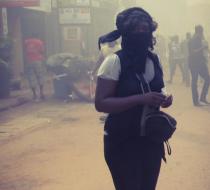Living a "Useful Life" 1 Favorite
She’s a 28-year-old businesswoman and singer in Burkina Faso. Cendrine Nama tells us how she combines the two as an activist for women’s rights.
I’m an entrepreneur in the field of communications and design. I’m also a fervent human rights activist. Why such unexpected choices? Nothing could have predicted that the calm and quiet girl that I was would end up picking so many battles. Starting a business in this economic climate is hard enough; being young and being a woman makes it even more of a struggle. But I couldn’t just remain passive; I had to fight my way through.
I grew up in the city in a modest home. My father was a teacher and my mother a midwife. They taught me that I had as many rights as the men of the family, that I should make my own choices and do what I wanted to do.
When I was a little girl, I kept asking people around me: “Why? Why can’t you do this? Why can’t you do that?” And they would say, “That’s just the way it is; it’s always been like that.” And I would ask, “Why is it like that? Am I inferior to my brother because I’m a girl?”
But at home it wasn’t like that. My brother and I were treated equally; he did the dishes and I cooked. From a very young age, my parents taught me the values of hard work, the courage to have your opinions, altruism and above all, to love and accept yourself.
But once I left the family cocoon, I had a view of the real world and realized that not everyone lives according to these rules. I saw that in society, things were not the same as at home, and what I considered to be basic and essential was not available to everyone – that fundamental rights were being flouted.
One day, I overheard someone say in Moore: "Paag y'a CM2 ba la." They were saying that girls didn’t need to go further than primary school, they just needed to know enough to pay for vegetables at the market. I realised women had virtually no rights. What they had was duties. They didn’t even have the right to choose what happened in their own lives. They remained eternally minors, passed from the guardianship of their fathers to that of their husbands. Paradoxically, when my parents sent me to the village during the holidays, I noticed that it was the women who provided for the whole family, thanks to their small businesses and other activities. Still, that didn’t give them the right to make their own choices.
I told myself that we need to try to change this, because we live in a society where women think they have no rights at all. All they have is the possibility of finding a man. And this injustice is what motivates my activism today.
Now, with the launch of the My Body My Rights campaign, I’m hoping to see a new way of thinking emerge so that women feel free to make their own choices and their dignity is restored. I want this to be a time when men will fight so that women can live free and whole.
In my activism, I encountered so many people who have, in their own manner, convinced me that everyone can take action. It is these people and these moments that galvanise me. Regardless of the difficulties that I may encounter, or the discouraging words I may hear, I press on. I say: “No, I want to live a useful life.”






